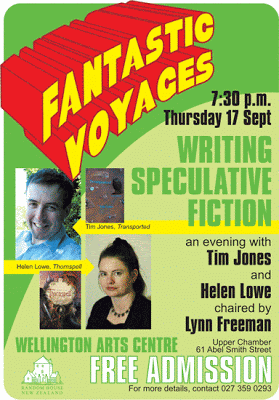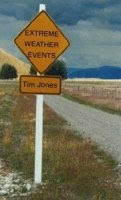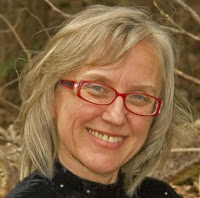
Former biologist and science writer, Canadian Julie E. Czerneda has turned her passion for living things and love of science fiction into a career as an awarding winning author and editor. Today, with thirteen novels in print from DAW Books, and six more under contract, she also keeps busy editing anthologies, when not doing workshops for educators and the public on scientific literacy and SF. Her latest anthology is Ages of Wonder from DAW Books, with co-editor Rob St.Martin, featuring stories with fantasy settings based in lesser used points of human history.
As for her novels, this summer sees the release of Rift in the Sky, the concluding volume of her latest trilogy, the Stratification Cycle of the Clan Chronicles. Which oddly enough, started with her very first novel, A Thousand Words for Stranger, the book that made Julie a finalist for the Campbell Award for Best New Writer at the last Australian Worldcon. Her Nebula-nominated Species Imperative trilogy was set in part in New Zealand and In the Company of Others was inspired by the introduction of non-native fauna to that country. And now she’s here at last, proving the world is truly a circular place.
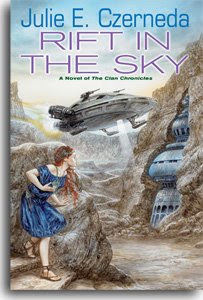
Questions
New Zealanders are famous for asking visitors “What do you think of New Zealand?” as soon as they are through customs, to which the standard answer is “I liked the inside of the customs shed”. So, Julie: What brings you to New Zealand, and how did you like the inside of the customs shed?
Actually, I loved the inside of your customs “shed.” Especially the Biodiversity Beagle. Brilliant. And Auckland’s Airport is gorgeous. By the way, nice touch having passengers walk out through the duty-free shop.
What brings me to your magnificent country? The kind invitation to be the International Guest of Honour at ConScription, the New Zealand National Convention for Science Fiction and Fantasy. I still pinch myself, even though I’m here.
With Nalini Singh, you are running a three-day writers’ workshop before ConScription. What do you hope that the participating writers will get out of this workshop?
Excitement, enthusiasm, a new and/or renewed belief in what they want to accomplish, some practical advice and information. Being a writer – putting your dreams in front of strangers – is incredibly brave. Whatever we can do to help and encourage, we will.
You’re a Canadian science fiction and fantasy author, and a four-time winner of a Prix Aurora Award, which is the well-established Canadian equivalent of New Zealand’s Sir Julius Vogel Awards. Is the Canadian literary and publishing scene hospitable to science fiction and fantasy writers?
Yes and no. In young adult publishing, everything goes and speculative fiction across the board is sought by publishers in Canada because, in part, it has a readership they know how to reach. Recently there’s been a trend towards more SF and F from Canadian publishers. I think much of that is due to people who understand those genre and their readers becoming senior editors. In literary circles, though, as I’m sure is the case for other youngish countries trying to establish a national “voice,” we face an uphill struggle for recognition. Science fiction in particular is considered commercial or entertainment, rather than serious work, and you’ll see authors scrambling to distance themselves from that label even now. Which is silly. Hopefully we’ll grow up soon.
Do the Francophone and Anglophone SF communities in Canada work closely together?
Yes, in the sense of fan communities and connections between authors. Not directly, in the sense of publishing. Unfortunately work isn’t automatically translated into both official languages. Instead, there’s a bewildering array of options and government funding that usually puts Francophone work in French only and Anglophone work only in English. Then there’s the issue of publishing in France, which isn’t the same French or funding, so those titles tend to cost most of all. Where we do work closely together is in promoting science fiction, as you’ll find at Anticipation, the Worldcon in Montreal this summer, and in collaborations. I have many colleagues in Quebec, writers, artists, and editors.
When I think about other Canadian SF writers, the names Nalo Hopkinson, Robert Sawyer and Elisabeth Vonarburg come to mind – not to mention Margaret Atwood. Which other Canadian SF writers should we be looking out for?
Tanya Huff! She’s been around for over twenty years and writing marvelous SF and fantasy. Probably one of our best and yet most overlooked authors. Her contemporary fantasy is often set in Toronto, which makes them even more fun. James Alan Gardner, Douglas Smith are two to keep in mind for sure. Robert Wilson. Peter Watts. There are many more.
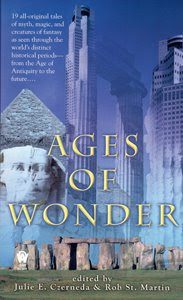
Do you have one novel, or one series, that is your favourite among all the novels you have written?
The one I’m writing now. ::laughs:: It’s always that way. I love them all, but the new face is the one that has all my heart.
Not all writers are willing to talk about their current writing projects, so feel free to disregard this question, but what are you working on at the moment?
My favourite! (I had to say that.) What I’m writing now is something I started 7 years ago. It’s a standalone fantasy novel called A Turn of Light. I’ve always enjoyed reading fantasy, but never quite dared write it. After all, I’m a biologist not a lyricist, and to me, great fantasy is about the words every bit as much as it is about the story. But an idea had niggled at me, so I took a fountain pen and a notebook and began writing a sentence here, a note there. When I realized I knew what the story would be, I mentioned it to my editor at DAW, Sheila Gilbert. I’m sure it was a surprise to have her hard sf author trot out a romantic story with dragons and spells and magic! She took it well. And took the book. Such trust. Now, of course, comes the part where I produce it. Wish me luck.
You are a science educator as well as a novelist. Do you find it easy to switch between the two types of writing involved?
I find it wrenchingly painful, like pulling off a bandage. Best done quickly, with grim determination. That would be when I have to put aside the fiction to write non-fiction. To go the other way is like going camping – you leave concepts like time behind and paddle into the wilderness, grinning like an idiot. When I was still writing a great deal of non-fiction, I had a separate office and computer, so I could focus. Now, I only do the occasional feature or special request, which makes it easier.
Not that doing both was all bad. Typically the research I’d do for a science article would also find its way into my SF.
Finally, Helen Lowe suggested that I ask you about your views on the capability of science fiction to develop readers, literacy and creativity. As a keen science fiction reader in high school, that struck a chord with me. Please tell me more!
There’s something that happens to people who stop reading imaginative works at a young age. Their ability to ask questions as adults is blunted. Worse, they lose the flexibility of thought that could help them find answers. We live in an age of technological and scientific change right in our homes, let alone all around us. Everyone needs to be able to speculate about possibilities, to reason from what’s before them to what might happen, to ask questions and find answers. The literature that promotes speculation and reasoning is science fiction. Change is what SF is about. You couldn’t ask for a better question than “what if …”
SF allows us to examine horrifying futures and the most dreadful consequences in utter safety. That’s important, especially when dealing with students. It allows us to leap past what we can do now, to imagine new applications or needs. That’s important for anyone, especially scientists. And science fiction rejuvenates the imagination in a way nothing else can do. That’s something we can’t afford to leave behind with childhood. Not and survive.
Plus being great fun. I did mention that part, I hope.
UPDATE: I forgot to mention that Julie is giving a talk at Manukau Libraries on Tuesday May 26th – thanks “Anonymous” for reminding me. Details are here, although I note registration closed yesterday.


